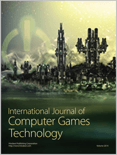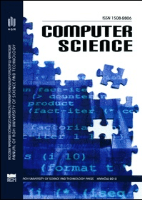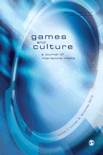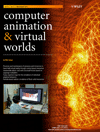
International Journal of Computer Games Technology
Scope & Guideline
Advancing the Future of Gaming Technology
Introduction
Aims and Scopes
- Game Design and Development:
The journal emphasizes research on the design and development of games, including serious games, educational games, and therapeutic applications, showcasing methodologies that enhance player engagement and learning outcomes. - Player Interaction and Engagement:
A core focus is on understanding player behavior, motivations, and engagement strategies, particularly how game mechanics can influence players' intentions, such as continued play and purchasing decisions. - Technology Integration in Gaming:
The journal explores the integration of advanced technologies like virtual reality, cloud computing, and artificial intelligence in gaming, investigating their applications in enhancing user experience and gameplay. - Social Impact and Educational Applications:
Research on the role of video games in social change, education, and health is prominent, reflecting the journal's commitment to studying games as tools for awareness, attitude change, and skill development. - Game Analytics and Modeling:
The journal includes studies that employ data analytics and modeling techniques to understand game dynamics, player behavior, and to optimize game design through empirical research.
Trending and Emerging
- Serious Games and Gamification:
There is an increasing focus on serious games and gamification strategies, particularly in educational and therapeutic contexts, showcasing their effectiveness in enhancing learning and behavior change. - AI and Machine Learning Applications:
Emerging research on the use of artificial intelligence and machine learning in game development, particularly for enhancing player experiences and automating game design processes, is gaining traction. - Impact of Virtual and Augmented Reality:
The exploration of virtual and augmented reality technologies in gaming is on the rise, reflecting their growing importance in creating immersive experiences and their applications in various fields such as education and healthcare. - Social and Behavioral Impacts of Gaming:
Research examining the social implications of gaming, including its effects on behavior, social change, and community engagement, is trending, indicating a deeper exploration of gaming's role in society. - Data-Driven Game Design:
There is a notable increase in studies utilizing player analytics and data modeling to inform game design decisions, reflecting a shift towards evidence-based approaches in game development.
Declining or Waning
- Traditional Game Mechanics:
Research centered around traditional game mechanics and gameplay paradigms has decreased, suggesting a shift towards more innovative and technology-driven approaches in game design. - General Usability Studies:
While usability remains important, specific studies focusing solely on general usability heuristics without ties to innovative game technologies or player engagement strategies are less frequently published. - Physical Fitness in Gaming:
Although physical fitness related to gaming, such as exergames, was once a prominent topic, recent publications indicate a waning interest as the focus shifts to more psychological and social aspects of gaming.
Similar Journals

Computer Science-AGH
Advancing the Frontiers of Computer Science ResearchComputer Science-AGH, published by the AGH University of Science & Technology Press in Poland, is an esteemed open access journal that has been disseminating high-quality research since 2004. With ISSN 1508-2806 and E-ISSN 2300-7036, this journal focuses on a diverse range of areas within the computer science discipline, including but not limited to Artificial Intelligence, Computational Theory, Computer Graphics, and Networks. While it currently holds a Q4 ranking across several categories as of 2023, it actively promotes research that contributes to the academic community's understanding and evolution in the field. The journal's commitment to open access ensures that vital research is accessible to a wider audience, fostering collaboration and innovation. With its comprehensive focus and strategic publication goals, Computer Science-AGH plays a crucial role in advancing the frontiers of computer science research and education, making it an invaluable resource for researchers, professionals, and students alike.

COMPUTING AND INFORMATICS
Pioneering Insights in Computational Theory and ApplicationsCOMPUTING AND INFORMATICS is a peer-reviewed academic journal published by the Slovak Academy of Sciences Institute of Informatics, focusing on various aspects of computer science and its applications. Established in 2000, this journal has garnered attention for its emphasis on computational theory, computer networks, software development, and hardware architecture, placing it in the competitive landscape of academic publishing with currently a Q3 ranking in the fields of Computational Theory and Mathematics, and Computer Networks and Communications, as well as Q4 ranking in Software and Hardware and Architecture categories. Readers can access its findings through Open Access, promoting wider dissemination of innovative research. With an ISSN of 1335-9150 and an E-ISSN of 1335-9150, the journal serves as a vital platform for showcasing cutting-edge research in the field, aiming to bridge theoretical foundations with practical applications. This journal not only contributes to the academic community but also supports the ongoing advancements in technology and informatics, making it an important resource for researchers, professionals, and students keen on staying at the forefront of the field.

Games for Health Journal
Pioneering research at the crossroads of gaming and health.Games for Health Journal, published by MARY ANN LIEBERT, INC, is a pioneering journal at the intersection of gaming technology and health, dedicated to advancing the understanding of how digital games can influence health outcomes. Since its inception in 2012 and continuing through 2024, this highly regarded journal has established itself as an essential resource, achieving impressive rankings in a variety of categories—specifically, Q1 in both Health (Social Science) and Rehabilitation, and Q2 in Computer Science Applications and Public Health. Accessibility to cutting-edge research is facilitated through its current Scopus rank, which places it among the top tiers of its field, ensuring it is a vital tool for researchers, professionals, and students keen on exploring innovative approaches to health through gaming. Moreover, the absence of Open Access underscores the journal's commitment to rigorous peer-reviewed content, ensuring high-quality contributions from experts across disciplines. By bridging technology and health, Games for Health Journal stands at the forefront of shaping health-related gaming research, guiding future innovations and applications in the ever-evolving landscape of health solutions.

Journal of Dynamics and Games
Advancing Mathematical Frontiers in Dynamics and GamesJournal of Dynamics and Games is a premier publication dedicated to advancing the fields of Applied Mathematics, Modeling and Simulation, and Statistics and Probability. Published by the American Institute of Mathematical Sciences (AIMS), this journal serves as a critical platform for researchers, professionals, and students to disseminate innovative theoretical findings and practical applications. With an ISSN of 2164-6066 and an E-ISSN of 2164-6074, it has gained recognition within its field, currently positioned in the Q3 quartile across various categories according to the latest evaluations from 2023. This multidisciplinary journal, running from 2014 to 2024, allows for a rich exchange of ideas and promotes the integration of mathematical theories in complex dynamical systems and games. Although it does not offer an open access option, its rigorous peer-review process ensures high-quality research papers, fostering an academic environment conducive to innovation and collaboration.

Games and Culture
Exploring the Nexus of Play and SocietyGames and Culture is a premier interdisciplinary journal published by SAGE Publications Inc, focusing on the rich intersection of gaming, culture, and society. With an ISSN of 1555-4120 and an E-ISSN of 1555-4139, this esteemed journal facilitates critical discussions and innovative research contributions in fields ranging from anthropology and communication to applied psychology and cultural studies. Its exceptional standing is reflected in its various Scopus rankings, placing it in the 99th percentile for Cultural Studies and the 98th percentile for Anthropology, among others. Covering research from its inception in 2006 through 2024, Games and Culture is devoted to advancing the understanding of how games influence cultural expressions and vice versa, making it an invaluable resource for academics, practitioners, and students alike. While the journal is not open access, its comprehensive scope and high-impact findings ensure that it remains a crucial platform for scholarly exchange and discovery in understanding the increasingly significant role of gaming in contemporary culture.

BEHAVIOUR & INFORMATION TECHNOLOGY
Pioneering Research at the Crossroads of Behavior and Tech.BEHAVIOUR & INFORMATION TECHNOLOGY, published by Taylor & Francis Ltd, is a leading journal in the interdisciplinary field that bridges the gap between technology and human behavior. Established in 1982 and continuing through 2024, this journal has garnered a high reputation with impressive rankings in 2023 across various categories: Q1 in Arts and Humanities (miscellaneous), Q2 in Developmental and Educational Psychology, Q2 in Human-Computer Interaction, and Q1 in Social Sciences (miscellaneous). The journal's robust Scopus rankings point to its influence among peers, being placed in the top percentiles across multiple relevant disciplines. Although it does not offer open access, it remains a pivotal resource for researchers and practitioners interested in the dynamics of technology's impact on behavior. By publishing rigorously peer-reviewed research, BEHAVIOUR & INFORMATION TECHNOLOGY aims to foster insights that enhance our understanding of how information technology shapes human interactions and societal outcomes, making it a crucial publication for anyone engaged in this rapidly evolving field.

Computers
Transforming Knowledge into Technological InnovationComputers is a leading journal published by MDPI, dedicated to advancing research in the fields of computer networks and communications, as well as human-computer interaction. Since its inception in 2012, it has established itself as a vital resource for scholars and practitioners, achieving an impressive Q2 ranking in Computer Networks and Communications and a Q3 ranking in Human-Computer Interaction as of 2023. The journal is indexed in Scopus, highlighting its relevance with a rank of #135/395 and #72/145 in their respective categories. Published in Switzerland, this open-access journal ensures widespread dissemination of research findings, supporting the global academic community in enhancing technologies relevant to computer science. Access options are available, fostering an environment where knowledge is shared freely. With an emphasis on innovation, redesign, and collaboration between humans and technology, Computers plays a crucial role in shaping the future of digital interactions.

COMPUTER ANIMATION AND VIRTUAL WORLDS
Unleashing Potential in Animation and Virtual Environments.COMPUTER ANIMATION AND VIRTUAL WORLDS, published by Wiley, is a pivotal journal in the fields of Computer Graphics and Computer-Aided Design, as well as Software. With a focus on the intersection of technology and creativity, the journal provides a platform for researchers and professionals to share innovative studies, new methodologies, and insights that shape the future of computer animation and virtual environments. Currently holding a Q2 category in Computer Graphics and a Q3 in Software for 2023, it ranks #63 out of 106 in its niche, highlighting its influence and relevance in the academic community. Though the journal operates under a subscription model, it also offers options for open access, ensuring that a broader audience can engage with groundbreaking research. The journal has been publishing continuously since its inception in 2004 and looks forward to further contributions as it moves towards its 20th anniversary in 2024. Whether you are a seasoned researcher, an industry professional, or a student eager to explore these dynamic fields, COMPUTER ANIMATION AND VIRTUAL WORLDS is an essential resource for advancing knowledge and innovation.

COMMUNICATIONS OF THE ACM
Navigating the Evolution of Technology TogetherCOMMUNICATIONS OF THE ACM, an esteemed journal published by the Association for Computing Machinery, has been at the forefront of the field of computer science since its inception in 1958. With an impressive impact factor and recognized as a top-tier Q1 journal in its category, it is currently ranked 10th out of 232 journals in the general computer science category according to Scopus rankings. This journal provides a vital platform for researchers, professionals, and students to disseminate innovative ideas and advancements across various domains of computing. Although it does not offer open access, the journal remains accessible through institutional subscriptions, furthering its reach and influence within the academic community. As researchers continue to explore the rapid evolution of technology, COMMUNICATIONS OF THE ACM serves as an essential resource for high-quality research, fostering knowledge advancements and collaborative discourse within the ever-expanding world of computer science.

VIRTUAL REALITY
Diving Deep into the World of Virtual RealityVIRTUAL REALITY is a prestigious journal published by SPRINGER LONDON LTD that has been at the forefront of the field since its inception in 1995. This journal, with an ISSN of 1359-4338 and E-ISSN 1434-9957, serves as an indispensable resource for researchers, professionals, and students interested in the rapidly evolving domains of computer graphics, human-computer interaction, and software development. VIRTUAL REALITY holds an impressive Q1 ranking across relevant categories, reflecting its high impact within the academic community, with specific rankings such as 11th overall in Computer Graphics and Computer-Aided Design and 31st in Human-Computer Interaction. This journal aims to publish cutting-edge research that explores theoretical advancements and practical applications related to virtual environments, contributing significantly to knowledge and innovation. With access options available through institutional subscriptions, it continues to shape the landscape of its field and inspire future research in immersive technologies.